-
REVIEW12-08-2023
Educational technologies for accident prevention due to falls in childhood: a scoping review
Revista Brasileira de Enfermagem. 2023;76:e20220807
Abstract
REVIEWEducational technologies for accident prevention due to falls in childhood: a scoping review
Revista Brasileira de Enfermagem. 2023;76:e20220807
DOI 10.1590/0034-7167-2022-0807
Views0See moreABSTRACT
Objectives:
to map evidence on educational technology use for accident prevention due to falls in childhood.
Methods:
a scoping review, carried out in October and November 2022, in the MEDLINE, Web of Science, BDENF and CINAHL databases and LILACS bibliographic index. There was no delimitation of language or time. Data were extracted and analyzed descriptively by two independent researchers. The research protocol was registered in the Open Science Framework.
Results:
twenty-six studies were selected. Booklets, pamphlets and leaflets were the most used technologies, presenting health services as the most frequent environment to develop research on fall prevention. The technologies developed were important outcomes: increased knowledge of children, family members, caregivers, health and education professionals.
Conclusions:
educational technology use makes it possible to increase knowledge, adopt safe practices and reduce falls.

-
ORIGINAL ARTICLE12-08-2023
Systematization of perioperative nursing care in robotic surgery: instrument validation
Revista Brasileira de Enfermagem. 2023;76:e20220666
Abstract
ORIGINAL ARTICLESystematization of perioperative nursing care in robotic surgery: instrument validation
Revista Brasileira de Enfermagem. 2023;76:e20220666
DOI 10.1590/0034-7167-2022-0666
Views0ABSTRACT
Objective:
To develop and validate an instrument to assist in the systematization of perioperative nursing care in robotic surgery.
Methods:
Methodological study developed in four phases: content survey; textual elaboration; content validation by the group of expert judges and target audience; and elaboration of the electronic instrument layout.
Results:
Eleven expert judges and seven evaluators of the target audience participated. For validation, the Content Validity Index (CVI) was used with a 0.78 cutoff point. The instrument total CVI after evaluation was 0.90 by the expert judges and 0.88 by the target audience.
Conclusion:
The tool built was proved satisfactory for the systematization of perioperative nursing care. The instrument construction was based on the updated scientific literature and validated by the expert judges and target audience.
Keywords:Nursing CarePerioperative CarePerioperative NursingRobotic Surgical ProceduresValidation StudySee more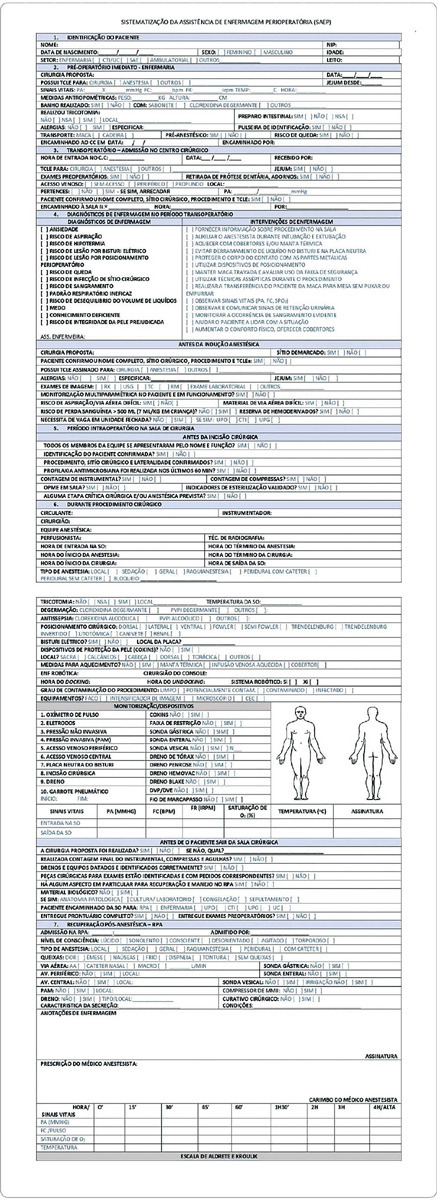
-
ORIGINAL ARTICLE12-08-2023
Influência da deambulação precoce combinada a terapia dhikr no peristaltismo intestinal de pacientes submetidos a colecistectomia aberta
Revista Brasileira de Enfermagem. 2023;76:e20220636
Abstract
ORIGINAL ARTICLEInfluência da deambulação precoce combinada a terapia dhikr no peristaltismo intestinal de pacientes submetidos a colecistectomia aberta
Revista Brasileira de Enfermagem. 2023;76:e20220636
DOI 10.1590/0034-7167-2022-0636
Views0RESUMEN
Objetivos:
analizar y determinar el efecto de una intervención que combinó la deambulación temprana y la terapia dhikr sobre la recuperación peristáltica intestinal de pacientes sometidos a colecistectomía abierta.
Métodos:
se utilizó un diseño preexperimental con un grupo pretest y postest. Las muestras incluyeron 15 pacientes sometidos a colecistectomía abierta y seleccionados mediante muestreo intencional. Los datos se recopilaron por medio de fichas de observación del instrumento y se analizaron mediante la prueba de Wilcoxon. La deambulación temprana utilizó el procedimiento operativo estándar en el hospital y la terapia dhikr se realizó durante 10 a 15 minutos, dos horas después de la operación.
Resultados:
la deambulación temprana asociada con la terapia dhikr afectó la recuperación peristáltica intestinal de los pacientes que se sometieron a colecistectomía abierta con anestesia general (Z =-3,442; p=0,001).
Conclusiones:
la combinación de la deambulación temprana con la terapia dhikr puede recomendarse como una intervención para mejorar el movimiento peristáltico intestinal de los pacientes después de una colecistectomía abierta con anestesia general.
Keywords:Anestesia GeralColecistectomiaDeambulação PrecoceEnfermagem PerioperatóriaTerapias ComplementaresSee more -
ORIGINAL ARTICLE12-08-2023
Early ambulation and dhikr complementary therapies effect on intestinal peristaltic in post-open cholecystectomy patients
Revista Brasileira de Enfermagem. 2023;76:e20220636
Abstract
ORIGINAL ARTICLEEarly ambulation and dhikr complementary therapies effect on intestinal peristaltic in post-open cholecystectomy patients
Revista Brasileira de Enfermagem. 2023;76:e20220636
DOI 10.1590/0034-7167-2022-0636
Views0ABSTRACT
Objectives:
to analyze and determine the effect of a combination intervention of early ambulation and dhikr therapy on intestinal peristaltic recovery in post-open cholecystectomy patients.
Methods:
a pre-experimental design with one group pre and post-test design was used. The samples were 15 post-open cholecystectomy patients which were selected using the purposive sampling technique. The data were collected using the instrument observation sheet and analyzed using the Wilcoxon test. Early ambulation used standard operational procedure in the hospital and dhikr therapy was carried out at 2 hours post-operation for 10-15 minutes.
Results:
there was an effect of early ambulation and dhikr therapy on intestinal peristaltic recovery in post-open cholecystectomy patients with general anesthesia (Z=-3.442; p=0.001).
Conclusions:
a combination of early ambulation and dhikr therapy can be recommended as interventions to improve intestinal peristaltic in a post-open cholecystectomy patient with general anesthesia.
Keywords:Anesthesia, GeneralCholecystectomyComplementary TherapiesEarly AmbulationPerioperative NursingSee more -
ORIGINAL ARTICLE12-08-2023
Workshop on pediatric trauma care: low-cost simulation
Revista Brasileira de Enfermagem. 2023;76:e20210485
Abstract
ORIGINAL ARTICLEWorkshop on pediatric trauma care: low-cost simulation
Revista Brasileira de Enfermagem. 2023;76:e20210485
DOI 10.1590/0034-7167-2021-0485
Views0See moreABSTRACT
Objective:
to assess nursing students’ and nurses’ knowledge, satisfaction and self-confidence after a theoretical workshop on emergency care for traumatized children and clinical simulation.
Methods:
a quasi-experimental study, carried out with nursing students and nurses residing at a public university in southern Brazil. A workshop on pediatric trauma care was created and a mannequin was created for simulations. A knowledge pre-test and post-test and the Student Satisfaction and Self-Confidence in Learning instrument were applied to measure satisfaction and self-confidence in learning. For analysis, descriptive statistics and the Wilcoxon test were used to compare means before and after intervention.
Results:
the difference between misses and hits was statistically significant (p<0.005), demonstrating an increase in participants’ knowledge after the workshop. Satisfaction and self-confidence were demonstrated in the instrument’s high scores.
Conclusions:
the effectiveness of the workshop in teaching-learning emergency care for pediatric trauma was demonstrated.
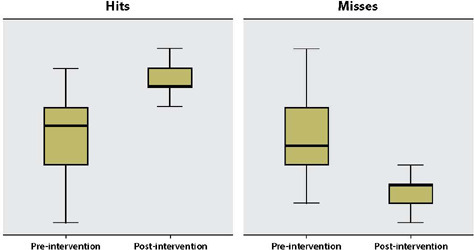
-
ORIGINAL ARTICLE12-08-2023
Validation of telesimulation in the care of late preterm newborns with hypoglycemia for nursing students
Revista Brasileira de Enfermagem. 2023;76:20220438
Abstract
ORIGINAL ARTICLEValidation of telesimulation in the care of late preterm newborns with hypoglycemia for nursing students
Revista Brasileira de Enfermagem. 2023;76:20220438
DOI 10.1590/0034-7167-2022-0438
Views0See moreABSTRACT
Objective:
To develop and validate a telesimulation scenario for nursing students in the care of late preterm infants with hypoglycemia.
Methods:
A methodological study conducted between August 2021 and May 2022 in a virtual environment involved constructing and validating the scenario with 10 experts, and testing it with 10 students. The content validity index assessed validity, with a threshold of 80% or higher, and suggestions were analyzed using semantic approximation.
Results:
Validation confirmed the appropriateness of all 14 scenario items, with an overall index of 97.8% and clarity and relevance indices of 98.5%. During testing, the overall index was 99.7%, with the “resources” item receiving the lowest score. Adjustments were made to objectives, technical terms, resources, and target audience based on feedback.
Conclusion:
Telesimulation is a widely accepted educational technology for training nursing students, with potential to enhance teaching quality and neonatal care.
-
ORIGINAL ARTICLE12-08-2023
Knowledge and practices about health among Quilombola men: contributions to health care
Revista Brasileira de Enfermagem. 2023;76:e20230138
Abstract
ORIGINAL ARTICLEKnowledge and practices about health among Quilombola men: contributions to health care
Revista Brasileira de Enfermagem. 2023;76:e20230138
DOI 10.1590/0034-7167-2023-0138
Views0ABSTRACT
Objective:
to analyze health knowledge and practices among Quilombola men.
Methods:
a qualitative, descriptive study, carried out with 40 men from two Quilombola communities in Santa Izabel do Pará, state of Pará, Brazil. Individual interviews were carried out using a semi-structured script. Text corpus was subjected to analysis with Interface de R pour les Analyses Multidimensionnelles de Textes et de Questionnaires 0.6, alpha 3, through Descending Hierarchical Classification.
Results:
among participants, eight (20.00%) were aged 55 to 59 years. 382 text segments were identified, with 299 (78.27%) being used, generating five lexical classes, which made up two subcorpora. The classes were organized into four thematic axes, covering knowledge about health and practices to prevent and solve health problems.
Final considerations:
men highlighted popular/traditional wisdom permeated by biomedical knowledge, translating their understanding of how to act to remain or become healthy.
Keywords:Health behaviorHealth of Ethnic MinoritiesMen’s HealthQuilombola CommunitiesVulnerable PopulationsSee more
-
ORIGINAL ARTICLE12-08-2023
Simulation-based training in Leprosy: development and validation of a scenario for community health workers
Revista Brasileira de Enfermagem. 2023;76:e20230114
Abstract
ORIGINAL ARTICLESimulation-based training in Leprosy: development and validation of a scenario for community health workers
Revista Brasileira de Enfermagem. 2023;76:e20230114
DOI 10.1590/0034-7167-2023-0114
Views0See moreABSTRACT
Objectives:
To build and validate a clinical simulation scenario designed to instruct community health workers (CHWs) in active leprosy case detection.
Methods:
Methodological study involving the development of a simulated clinical scenario and content validation by experts. The Content Validity Index (CVI) was used to determine the level of agreement among the judging commitee, and a descriptive analysis of their recommendations was performed.
Results:
A simulated scenario with a simulated participant was developed — a simulation characterized by low complexity, moderate physical/environmental fidelity, moderate to high psychological fidelity, and high conceptual fidelity, lasting 50 minutes and capable of training up to 10 CHWs simultaneously. The scenario was validated by 14 experts, with a CVI exceeding 80% for all components.
Conclusions:
The validated clinical simulation possesses attributes that make it highly reproducible in various national health contexts, thereby contributing to the global “Towards Zero Leprosy” strategy.
-
RESEARCH01-01-2015
Nursing actions in primary care and the control of diseases preventable through vaccines
Revista Brasileira de Enfermagem. 2015;68(5):803-809
Abstract
RESEARCHNursing actions in primary care and the control of diseases preventable through vaccines
Revista Brasileira de Enfermagem. 2015;68(5):803-809
DOI 10.1590/0034-7167.2015680506i
Views0See moreABSTRACT
Objective:
to discuss the actions performed by nurses in the control and eradication of diseases preventable with vaccines in healthcare setting, according to the National Primary Health Care Policy.
Method:
qualitative research supported by the social phenomenology of Schutz. It had as its setting a Family Health Clinic, located in the city of Rio de Janeiro (Brazil), with ten nurses. The data collection occurred through interviews.
Results:
nurses’ actions aimed at the control and eradication of preventable diseases mainly involve updating a vaccination card, administering the vaccine, and guiding the user of the Health Unit, with the purpose of preventing diseases. The National Primary Care Policy and all manuals from the Ministry of Health recognize the importance of focusing on the service user.
Conclusion:
the user’s lifestyle must be considered, and his access to services aiming at the expansion of the control of diseases preventable with vaccines should be promoted.

-
RESEARCH01-01-2015
Children with neuropsychomotor development delay: music therapy promoting quality of life
Revista Brasileira de Enfermagem. 2015;68(5):797-802
Abstract
RESEARCHChildren with neuropsychomotor development delay: music therapy promoting quality of life
Revista Brasileira de Enfermagem. 2015;68(5):797-802
DOI 10.1590/0034-7167.2015680505i
Views0See moreABSTRACT
Objective:
to identify the influence of music therapy on the behavior and quality of life of children with neuropsychomotor development delay (NPMDD).
Method:
experimental research, with applications of music therapy (in a group of children) held in the specialized association in Cruz das Almas – Bahia, composed of 17 children with NPMDD aged 5 to 12 years. The behavior of children involving emotional, physical, social and school aspects was observed.
Results:
there was an evolution in all aspects, being this improvement significant to Emotional Capacity and School Capacity domains, showing the beneficial effects of music therapy.
Conclusion:
music therapy becomes a treatment option for children with NPMDD, improving their quality of life.

-
RESEARCH01-01-2015
Spirituality, religion and personal beliefs of adolescents with cancer
Revista Brasileira de Enfermagem. 2015;68(5):791-796
Abstract
RESEARCHSpirituality, religion and personal beliefs of adolescents with cancer
Revista Brasileira de Enfermagem. 2015;68(5):791-796
DOI 10.1590/0034-7167.2015680504i
Views0See moreABSTRACT
Objective:
to examine adolescents’ perception about spirituality, religion and personal beliefs in their lives due to cancer and a possible strategy for coping with the disease.
Method:
qualitative research, both descriptive and exploratory. The data were collected by means of a personal semi-structured interview, and the categories were analyzed by content analyzes.
Results:
nine adolescents who were undergoing cancer treatment at one of the two institutions located Uberaba, Brazil, participated in the study. Based on the analysis and interpretation of results, it was possible to systematize them according to four categories: spiritual history of the individual; faith and belief; importance of spirituality in their lives, and the community acting as a spiritual supporter. Most adolescents referred to spirituality as being an important tool for dealing with the disease, especially concerning religious rituals and community support.
Conclusion:
spirituality creates hope for adolescents, which helps them to cope with cancer-related diffi culties and contribute to the search for the meaning of life.
-
RESEARCH01-01-2015
Coping strategies of nursing students for dealing with university stress
Revista Brasileira de Enfermagem. 2015;68(5):783-790
Abstract
RESEARCHCoping strategies of nursing students for dealing with university stress
Revista Brasileira de Enfermagem. 2015;68(5):783-790
DOI 10.1590/0034-7167.2015680503i
Views0See moreABSTRACT
Objective:
to identify the coping strategies used by nursing students in a university in southern Brazil, establishing the relationship between the sociodemographic and academic variables examined.
Method:
an exploratory, descriptive, quantitative study, carried out with 146 nursing students, through application of the Coping Strategies Inventory. For the data analysis, descriptive statistics, analysis of variance and regression analysis were used.
Results:
it was found that the coping strategy most used by nursing students is escape. A connection was also detected between the academic dissatisfaction variable and the use of negative coping strategies.
Conclusion:
it was noted that students satisfi ed with the course used positive coping strategies targeting the problem, whereas dissatisfi ed students used negative strategies focusing on the emotion.

-
RESEARCH01-01-2015
Unemployment and psychological distress in nurses
Revista Brasileira de Enfermagem. 2015;68(5):775-782
Abstract
RESEARCHUnemployment and psychological distress in nurses
Revista Brasileira de Enfermagem. 2015;68(5):775-782
DOI 10.1590/0034-7167.2015680502i
Views0See moreABSTRACT
Objective:
to assess psychological distress in nurses searching for their first job, especially symptoms of depression, and identify the factors that caused mental suffering, and how these nurses cope with the situation.
Method:
this was a qualitative study carried out with unemployed nurses who had graduated less than two years before the time of the study, and were residents of the town of Assis in the Brazilian state of São Paulo. Data were gathered by means of semi-structured interviews, content analysis, and application of the Beck Depression Inventory psychometric scale.
Results:
of the 14 nurses that participated, three had scores on the psychometric scale indicative of depression. Participants reported psychological distress related to unemployment, poor university education, and surplus labor due to the large number of graduates and lack of jobs, as well as a culture of employment centered on professionals’ social networks. The unemployed nurses did not have effective ways of coping.
Conclusion:
unemployment promoted psychological distress among the new nurses, especially symptoms of depression, without effective means of coping.
-
EDITORIAL01-01-2015
Newborn blood spot screening: to expand or not to expand?
Revista Brasileira de Enfermagem. 2015;68(5):771-772
Abstract
EDITORIALNewborn blood spot screening: to expand or not to expand?
Revista Brasileira de Enfermagem. 2015;68(5):771-772
DOI 10.1590/0034-7167.2015680501i
Views0“The principal constraint on what we can detect in newborn screening is fast becoming what we choose to detect: rather than what is limited for us by technical feasibility or cost”().Technological advances are providing the medical world an opportunity to extend the number of conditions newborn babies are screened for. Tandem mass spectrometry (TMS, also […]See more -
EDITORIAL01-01-2015
Teste de triagem neonatal: expandir ou não expandir?
Revista Brasileira de Enfermagem. 2015;68(5):771-772
Abstract
EDITORIALTeste de triagem neonatal: expandir ou não expandir?
Revista Brasileira de Enfermagem. 2015;68(5):771-772
DOI 10.1590/0034-7167.2015680501i
Views0“A principal restrição sobre o que podemos detectar no teste de triagem neonatal está rapidamente se tornando o que escolhemos detectar em vez daquilo que nos é limitado por razão de viabilidade técnica ou custo”().Os avanços tecnológicos estão conferindo ao mundo médico uma oportunidade de aumentar o número de patologias para as quais os recém-nascidos […]See more -
REVIEW01-01-2015
International Classification for Nursing Practice – ICNP®: application to the Brazilian reality
Revista Brasileira de Enfermagem. 2015;68(4):730-731
Abstract
REVIEWInternational Classification for Nursing Practice – ICNP®: application to the Brazilian reality
Revista Brasileira de Enfermagem. 2015;68(4):730-731
DOI 10.1590/0034-7167.2015680422i
Views0The author and organizer, Telma Ribeiro Garcia, added her theoretical and practical knowledge to those of a dozen other authors for the creation of the book “International Classification for Nursing Practice – ICNP®: application to the Brazilian reality”. She is a retired professor of the Department of Public Health Nursing and Psychiatry at the Federal […]See more
-
ORIGINAL ARTICLE06-14-2024
Mid-range theory of the nursing diagnosis Overweight
Revista Brasileira de Enfermagem. 2024;77(2):e20230372
Abstract
ORIGINAL ARTICLEMid-range theory of the nursing diagnosis Overweight
Revista Brasileira de Enfermagem. 2024;77(2):e20230372
DOI 10.1590/0034-7167-2023-0372
Views0See moreABSTRACT
Objective:
To build a mid-range theory for the nursing diagnosis Overweight in adolescents and young adults.
Methods:
A methodological study in the light of the theoretical frameworks of Roy and of Lopes, Silva and Herdman. A total of 3,925 articles were retrieved and assessed using the State of the Art Through Systematic Review software. The final sample consisted of 28 articles.
Results:
The findings converged to 3 essential attributes, 13 antecedents, and 7 consequences. A mid-range theory was built consisting of an illustrated diagram, 11 propositions, and 12 causal relationships.
Final considerations:
From the creation of the theory, it was possible to better understand the nursing diagnosis Overweight within the context of adolescents and young adults. Understanding nursing phenomena contributes to nursing science’s advancement and strengthening.
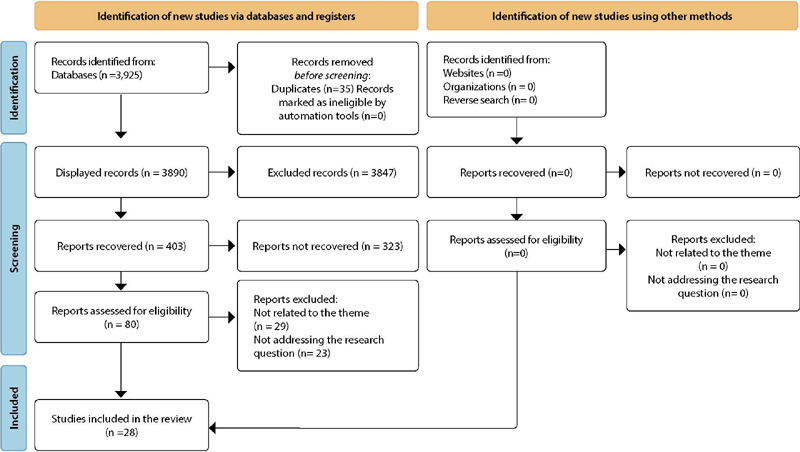
-
ORIGINAL ARTICLE06-14-2024
Cardiovascular Risk and Lifestyle: comparison between teaching workers in Portugal and Brazil
Revista Brasileira de Enfermagem. 2024;77(2):e20230354
Abstract
ORIGINAL ARTICLECardiovascular Risk and Lifestyle: comparison between teaching workers in Portugal and Brazil
Revista Brasileira de Enfermagem. 2024;77(2):e20230354
DOI 10.1590/0034-7167-2023-0354
Views0ABSTRACT
Objective:
Compare Cardiovascular Risk between workers in Brazil and Portugal who work in the teaching context and its relationship with Lifestyle and Common Mental Disorder.
Methods:
Cross-sectional study that compared the cardiovascular health conditions of teaching workers in Manaus (Brazil) and Coimbra (Portugal). The odds ratio between groups was estimated.
Results:
The differences were: Smoking and hypercholesterolemia in participants from Portugal. Hypertension, chronic disease, increased abdominal perimeter, common mental disorder, and absence from work in Brazil. The variables with the greatest effect for high cardiovascular risk were: Country-Portugal [17.273 (95%CI1.538-193.951)], sex-male [61.577 (95%CI5.398-702.469)] and smoking [593.398 (95%CI57.330-6.142.020)].
Conclusion:
The differences in risk between groups showed that participants from Portugal, men, with high blood pressure and/or smokers are the most vulnerable to having a cardiovascular event. There is a need for interventions to promote cardiovascular health in the workplace in both countries.
Keywords:Community-Based Participatory ResearchHeart Disease Risk FactorsLife StyleOccupational HealthUniversitiesSee more -
ORIGINAL ARTICLE06-14-2024
Functional performance assessment scale for children and adolescents with cancer: cross-cultural study
Revista Brasileira de Enfermagem. 2024;77(2):e20230331
Abstract
ORIGINAL ARTICLEFunctional performance assessment scale for children and adolescents with cancer: cross-cultural study
Revista Brasileira de Enfermagem. 2024;77(2):e20230331
DOI 10.1590/0034-7167-2023-0331
Views0ABSTRACT
Objectives:
to describe the methodological process of cross-cultural adaptation of the PlayPerformance Scale for Children to Brazilian Portuguese.
Methods:
methodological study of translation and cross-cultural adaptation in six stages: translation, synthesis of translations, back-translation, evaluation by a committee of judges, evaluation by expert nurses, and pretest. The agreement and representativeness of the items were assessed using the content validity index. A minimum value of 80% agreement was considered.
Results:
all stages of the translation and cross-cultural adaptation process were satisfactory. In the evaluation performed by the committee of judges, all items obtained agreement above 80%. Fifteen pediatric nurses conducted the content validation, suggesting necessary modifications for understanding and application. Thirty children and adolescents with cancer were assessed with the scale for the pre-test.
Conclusions:
the scale was cross-culturally adapted to Brazilian Portuguese. The need for psychometric testing in a consistent sample is emphasized.
Keywords:Cross-Cultural ComparisonNursing Methodology ResearchOncologyPediatric NursingPhysical Functional PerformanceSee more -
ORIGINAL ARTICLE06-14-2024
Meanings attributed to health-related quality of life by caregivers of adolescents with diabetes
Revista Brasileira de Enfermagem. 2024;77(2):e20230314
Abstract
ORIGINAL ARTICLEMeanings attributed to health-related quality of life by caregivers of adolescents with diabetes
Revista Brasileira de Enfermagem. 2024;77(2):e20230314
DOI 10.1590/0034-7167-2023-0314
Views0See moreABSTRACT
Objective:
to interpret the meanings attributed to the health-related quality of life by caregivers of adolescents with type 1 diabetes mellitus.
Methods:
qualitative, descriptive-exploratory study of 14 caregivers of adolescents with diabetes developed at the reference outpatient clinic for endocrine diseases in a city in the state of Paraíba. Interviews were performed between May and September 2021. Inductive thematic analysis of the empirical material, and its interpretation in light of the concepts of health-related quality of life and family functioning were performed.
Results:
the meanings attributed by caregivers to the health-related quality of life of adolescents converged on the feeling of being healthy, healthy eating, satisfactory family income, family involvement in care and effective access to the care network.
Final Considerations:
knowledge of these meanings enables health professionals to develop strategies that meet the unique demands of caregivers experiencing this diagnosis.
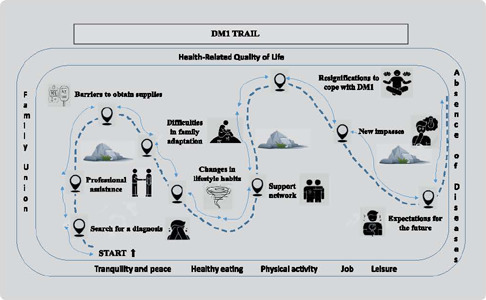
-
REVIEW06-14-2024
Critical analysis of the scientific production on Jean Watson’s Theory of Human Care
Revista Brasileira de Enfermagem. 2024;77(2):e20230231
Abstract
REVIEWCritical analysis of the scientific production on Jean Watson’s Theory of Human Care
Revista Brasileira de Enfermagem. 2024;77(2):e20230231
DOI 10.1590/0034-7167-2023-0231
Views0See moreABSTRACT
Objectives:
to analyze current scientific production on the use of the theoretical-methodological precepts of Jean Watson’s Theory of Human Care/Clinical Caritas Process.
Methods:
quantitative, exploratory, descriptive study using data from 1979 to 2023 in the Scopus database. Analysis was carried out using VOSviewer software.
Results:
the 73 studies included establish a network of collaboration among 221 authors from 155 institutions in 18 countries, who discuss the development of ethical behavior in nursing staff, through technical improvement, implementation, and validation of instrumental strategies capable of measuring and evaluating the quality of holistic and empathetic care. The Theory of Human Caring contributes to nursing training and care, and Process Clinical Caritas-Veritas is useful for the different possibilities of practice and education.
Conclusions:
it is important to strengthen with more empirical data a nursing work model centered on individual human care, supporting the evolution of scientific nursing knowledge.
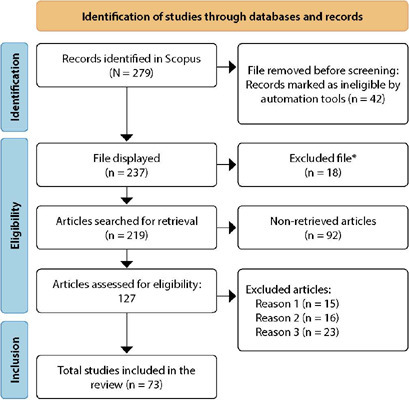
-
REVIEW06-14-2024
Primary health care professionals’ practice in the face of leprosy: a scoping review
Revista Brasileira de Enfermagem. 2024;77(2):e20230207
Abstract
REVIEWPrimary health care professionals’ practice in the face of leprosy: a scoping review
Revista Brasileira de Enfermagem. 2024;77(2):e20230207
DOI 10.1590/0034-7167-2023-0207
Views0See moreABSTRACT
Objectives:
to identify Primary Health Care professionals’ practice in the face of leprosy.
Methods:
a scoping review, carried out between November 2022 and January 2023, conducted according to the methodological structure proposed by JBI and checklist Preferred Reporting Items for Systematic Reviews and Meta-Analyses extension for Scoping Reviews in six databases and additional literature.
Results:
the sample consisted of 11 articles, published between 2008 and 2022. The findings were synthesized into three categories: Early diagnosis and timely treatment; Physical disability prevention; and Household and social contact surveillance.
Final Considerations:
there is a need to align the practices carried out with those recommended by the Brazilian National Program for Leprosy Control and Elimination, as some were not identified in studies, which implies losses to qualified assistance directed to patient demands, with a view to control and elimination of leprosy.
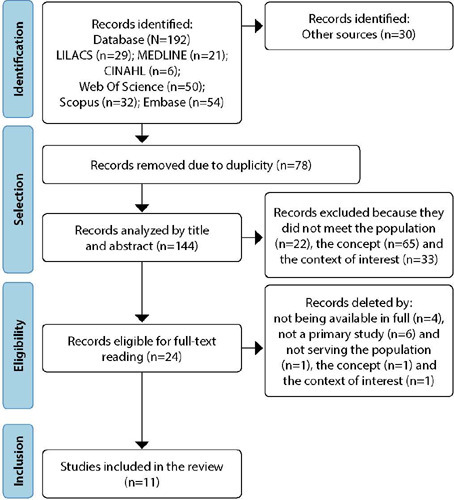
-
ORIGINAL ARTICLE06-14-2024
Validity of the TBApp mobile application for self-care management for people with tuberculosis
Revista Brasileira de Enfermagem. 2024;77(2):e20230195
Abstract
ORIGINAL ARTICLEValidity of the TBApp mobile application for self-care management for people with tuberculosis
Revista Brasileira de Enfermagem. 2024;77(2):e20230195
DOI 10.1590/0034-7167-2023-0195
Views1See moreABSTRACT
Objectives:
to describe the validity process of the TBApp mobile application for self-care management for people with tuberculosis linked to Primary Health Care.
Methods:
methodological research developed with ten expert judges, carried out virtually. The application was assessed in relation to content and technology quality in seven domains (objectivity; structure and appearance; relevance; functionality; reliability; usability; and efficiency), using an instrument with a Likert scale.
Results:
TBApp was considered valid, relevant, functional, reliable and effective by expert judges. The objectives, structure and presentation and relevance domains presented an overall Content Validity Index of 0.93, and the functionality, reliability, usability and efficiency domains presented characteristics and sub-characteristics values greater than 0.80.
Conclusions:
TBApp is a creative and innovative tool that can be used by people with TB and disseminated in the scientific community.
Search
Search in:
Nuvem de Tags
Aged (144) Atenção Primária à Saúde (239) COVID-19 (104) Cuidados de Enfermagem (269) Educação em Enfermagem (151) Educação em Saúde (139) Enfermagem (930) Estudos de Validação (131) Health Education (144) Idoso (208) Mental Health (149) Nursing (987) Nursing Care (306) Patient Safety (151) Primary Health Care (284) Qualidade de Vida (104) Quality of Life (106) Saúde Mental (145) Segurança do Paciente (150) Validation Studies (108)



